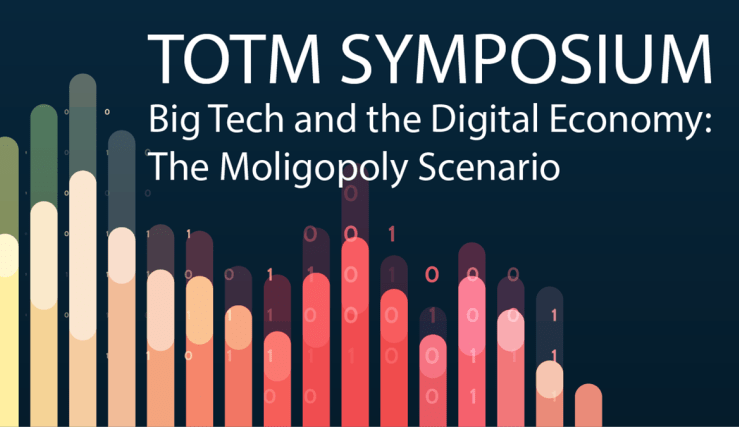Showing archive for: “Advertising”
The Competition and Transparency in Digital Advertising Act Is Fatally Flawed
The Competition and Transparency in Digital Advertising Act (CTDAA), introduced May 19 by Sens. Mike Lee (R-Utah), Ted Cruz (R-Texas), Amy Klobuchar (D-Minn.), and Richard Blumenthal (D-Conn.), is the latest manifestation of the congressional desire to “do something” legislatively about big digital platforms. Although different in substance from the other antitrust bills introduced this Congress, ... The Competition and Transparency in Digital Advertising Act Is Fatally Flawed
The FTC’s Privacy Report Fails to Justify Asymmetric Regulation of ISPs
Others already have noted that the Federal Trade Commission’s (FTC) recently released 6(b) report on the privacy practices of Internet service providers (ISPs) fails to comprehend that widespread adoption of privacy-enabling technology—in particular, Hypertext Transfer Protocol Secure (HTTPS) and DNS over HTTPS (DoH), but also the use of virtual private networks (VPNs)—largely precludes ISPs from ... The FTC’s Privacy Report Fails to Justify Asymmetric Regulation of ISPs
The Contestable Platform Paradox
Why do digital industries routinely lead to one company having a very large share of the market (at least if one defines markets narrowly)? To anyone familiar with competition policy discussions, the answer might seem obvious: network effects, scale-related economies, and other barriers to entry lead to winner-take-all dynamics in platform industries. Accordingly, it is ... The Contestable Platform Paradox
Is There Any Market Power in Online Display Advertising?
A lawsuit filed by the State of Texas and nine other states in December 2020 alleges, among other things, that Google has engaged in anticompetitive conduct related to its online display-advertising business. Broadly, the Texas complaint (previously discussed in this TOTM symposium) alleges that Google possesses market power in ad-buying tools and in search, illustrated ... Is There Any Market Power in Online Display Advertising?
Khan’s ‘Vision and Priorities for the FTC’ Statement Lacks Humility and Strategic Insight
Federal Trade Commission (FTC) Chair Lina Khan’s Sept. 22 memorandum to FTC commissioners and staff—entitled “Vision and Priorities for the FTC” (VP Memo)—offers valuable insights into the chair’s strategy and policy agenda for the commission. Unfortunately, it lacks an appreciation for the limits of antitrust and consumer-protection law; it also would have benefited from greater ... Khan’s ‘Vision and Priorities for the FTC’ Statement Lacks Humility and Strategic Insight
Using the Hypothetical Monopolist Test to Define the Relevant Market for Ad Tech
Policymakers’ recent focus on how Big Tech should be treated under antitrust law has been accompanied by claims that companies like Facebook and Google hold dominant positions in various “markets.” Notwithstanding the tendency to conflate whether a firm is large with whether it hold a dominant position, we must first answer the question most of ... Using the Hypothetical Monopolist Test to Define the Relevant Market for Ad Tech
Online Display Advertising: What’s the relevant market?
Digital advertising is the economic backbone of the Internet. It allows websites and apps to monetize their userbase without having to charge them fees, while the emergence of targeted ads allows this to be accomplished affordably and with less wasted time wasted. This advertising is facilitated by intermediaries using the “adtech stack,” through which advertisers ... Online Display Advertising: What’s the relevant market?
A Coasean Analysis of Offensive Speech
Words can wound. They can humiliate, anger, insult. University students—or, at least, a vociferous minority of them—are keen to prevent this injury by suppressing offensive speech. To ensure campuses are safe places, they militate for the cancellation of talks by speakers with opinions they find offensive, often successfully. And they campaign to get offensive professors ... A Coasean Analysis of Offensive Speech
How Changing Section 230 Could Disrupt Insurance Markets
In recent years, a diverse cross-section of advocates and politicians have leveled criticisms at Section 230 of the Communications Decency Act and its grant of legal immunity to interactive computer services. Proposed legislative changes to the law have been put forward by both Republicans and Democrats. It remains unclear whether Congress (or the courts) will ... How Changing Section 230 Could Disrupt Insurance Markets
Congress Should Not Grant the FTC Untrammeled Authority to Obtain Monetary Relief
The U.S. House this week passed H.R. 2668, the Consumer Protection and Recovery Act (CPRA), which authorizes the Federal Trade Commission (FTC) to seek monetary relief in federal courts for injunctions brought under Section 13(b) of the Federal Trade Commission Act. Potential relief under the CPRA is comprehensive. It includes “restitution for losses, rescission or ... Congress Should Not Grant the FTC Untrammeled Authority to Obtain Monetary Relief
Antitrust Statutorification
A lot of water has gone under the bridge since my book was published last year. To close this symposium, I thought I would discuss the new phase of antirust statutorification taking place before our eyes. In the United States, Congress is working on five antitrust bills that propose to subject platforms to stringent obligations, ... Antitrust Statutorification
Breaking Down House Democrats’ Forthcoming Competition Bills
Democratic leadership of the House Judiciary Committee have leaked the approach they plan to take to revise U.S. antitrust law and enforcement, with a particular focus on digital platforms. Broadly speaking, the bills would: raise fees for larger mergers and increase appropriations to the FTC and DOJ; require data portability and interoperability; declare that large ... Breaking Down House Democrats’ Forthcoming Competition Bills










